Search Terms Report in Google Ads – Why Is It So Valuable?

Google Ads Search Terms Report may just be the most important tool for your Search Campaign. While keywords are the building blocks of a good Search Campaign, understanding and correctly utilizing the Search Terms Report can make the difference between a good and an excellent-performing campaign.
You may have crossed paths with it before, but maybe you haven’t, not to worry, we will go over the key elements of the Search Terms Report and we would like to help you start putting it to good use.
Key Takeaways
- Use the Search Terms Report in Google Ads to gain insights into the queries triggering your ads. This helps in understanding customer search behavior.
- Distinguish between search terms and keywords for more effective campaign optimization. This distinction guides your strategy adjustments.
- Regular analysis of the search terms report is key. It helps identify high-performing search terms, which can be added as keywords, and irrelevant ones, which should be excluded.
- Actively refining your keyword list based on the report’s insights improves targeting and campaign efficiency, leading to better ROI.
What is The Search Terms Report in Google Ads?
The search terms report in Google Ads is a table report that provides managers with insights into the queries that people have actually typed on Google or other partner search networks.
These search terms, or queries, are triggered by the keywords targeted in the Search Campaign. This data provides valuable insights into what kind of searches done on Google the ads have been shown.
Where to find the search terms report? Follow these 5 steps:
- Sign in to your Google Ads account
- Open the navigation menu on the top left
- Select “All Campaigns”
- On the menu page select “Keywords”
- Under “Keywords” select “Search Terms”
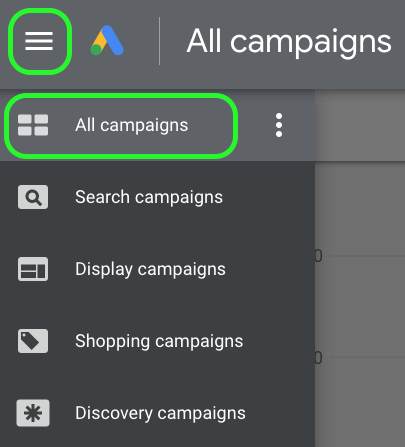
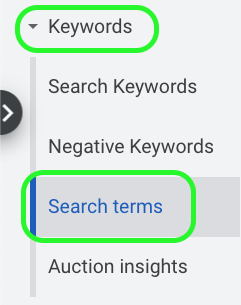
Search Terms vs Search Keywords
Before moving forward it’s important to make the distinction between search terms and search keywords. So then what exactly separates them:
- Search Terms: these represent the actual queries that users type on the Google search bar or other search networks partners with Google (like YouTube).
- Search Keywords: these are the words or strings of words that advertisers target in their Search campaigns. They are added on the ad group level and they can be added in different match types.
We don’t hold much direct control over the search terms as they are mainly dependent on what other people type when searching, but they are also strongly related to the search keywords we have added in our ad groups. It is the search keywords that trigger our ads for different queries searched on search networks. Whether your ad shows or not, for various search terms, depends a lot on the match type of your different Google Ads keywords. We won’t go much into detail about the keyword match types, but there are three keyword match types, and here’s a simple breakdown:
- Exact Match – [keyword]: These match-type keywords are the most closed and strict type among the three of them. It’s characterized by brackets. When using it, your ads will show on queries that have the same meaning as the exact match keyword. With these keywords, the volumes will most probably be quite low, the avg.CPC will tend on the more expensive side, but with this match type, you will show on the highest quality searches.
- Phrase Match – “keyword”: This match type is currently in the middle, less strict, and more open to showing different search terms. When targeting phrase match keywords, your ads will show on searches that contain the meaning of the keyword. this match type is characterized by quotes.
- Broad Match – keyword: The last match type is the most open one of the three. When targeting broad match keywords your ads will show on searches that are related to the meaning of the keyword. These keywords aren’t characterized by any symbols like the previous two, just the keyword itself alone. They generate the highest amount of traffic and in general the avg.CPC is the lowest for these keywords. They also tend to generate lots of unqualified traffic that needs to be cleaned quite regularly.
We encourage you to check out the official documentation on match types by Google for additional explanations and examples.
Note: In the past, there were also broad modifier match-type keywords. Unfortunately, Google discontinued the BMM in 2021. That change shifted a lot how we run our Search campaigns and we had to find new solutions and adapt. Google on the same note pushed forward more of the “close variants” which you will also see in the Search Terms Report. The close variants allow keywords to show ads on other queries that are similar to the targeted keyword.
Close variants can include misspellings, singular and plural forms, acronyms, stem words (such as floor and flooring), abbreviations, accents, and variants of your keyword terms that have the same meaning.
Google Official Documentation
Why Is The Search Terms Report Important?
Now that we have made the distinction between the search keywords and search terms in Google Ads, we can focus on why the insights from the search terms report are so valuable and important.
The data of search terms found in the report can hold real value for your search campaigns. It can show the quality of the traffic that is being generated, holes that need to be closed within the keywords, and new opportunities that can be further explored.
Blog HubSpot – 25 Google Search Statistics To Bookmark ASAP
Although the exact numbers are not shared, we can all just assume the sheer volume of searches done on Google every day around the world. The point is, that there are many variations of the meaning of the keywords we are targeting that we can’t find ourselves manually and targeting each and every one of them.
This is one of the reasons why the Search Terms Report is so valuable today, it gives us an insight and a peek into the countless variations of the keyword we are targeting that is happening behind the curtains. Without it, we would be completely lost as to what exactly we are showing our ads on, and what are users really searching and we would simply miss out on so many of the variations if we were to do it ourselves.
The search terms found in the report reflect the quality of the keywords targeted and the traffic itself. A thorough analysis of the queries in the search terms report can show searches that are maybe not related to the business or variations that are too different from the initial keyword being targeted. On the other hand, it can uncover new variations of the same keyword that haven’t been thought of before. These are new opportunities that can help to grow and improve the performance of the campaign.
By diligently observing the search terms you will be also able to spot new uprising trends within your industry. In some cases smaller in some other instances bigger trends, but this can be very valuable as sometimes it’s difficult to predict what exactly may influence people and their interests. With this data, you should be able to catch the upcoming waves early and you will be able to jump ahead of the competition. In doing so, you will stay relevant to the users in regard to the trends and market fluctuations.
The analysis can also be taken on the level of the targeted keywords. The other reason why the Search Terms Report is so valuable is that not only you can look at the raw data of searches but also identify the associated keyword you are targeting that is generating the queries. By associating the search terms to a specific keyword you are targeting in your campaign you can judge its performance and whether it’s worth keeping it or not.
Pro Tip: Before making the call on pausing or even removing a keyword you are targeting, we strongly advise you to try to focus on cleaning the search terms first by excluding the unqualified ones, especially if you are using a smart bidding strategy for your campaign. Keywords within a campaign are interconnected to various degrees and by acting on the search terms level instead of the keyword level your changes will be more impactful while maintaining the overall structure of the campaign.
Here’s how to add “keyword” data field as a column in the Search Terms Report:
- Go to the Search Terms Report
- Select “COLUMNS” on the right side of the report
- In the search bar, look up “Keyword”
- Select the suggested “Keyword” data field
- Adjust the position in the report if needed
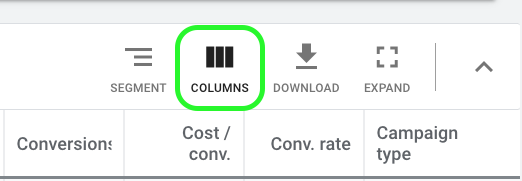
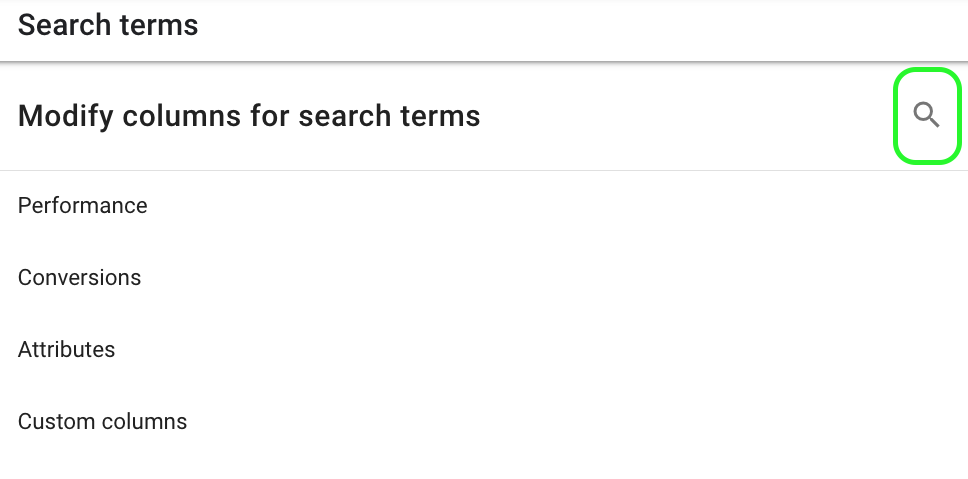
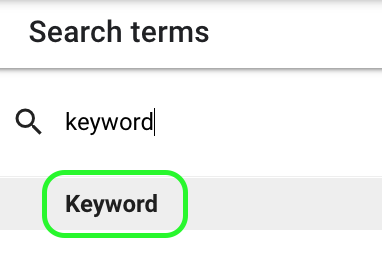
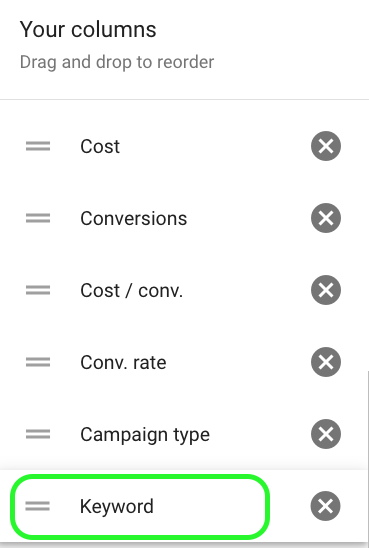
Pro Tip: There is also another way to check the search terms generated by one or a group of keywords. Here’s how to do it:
- Select the specific campaign or “All Campaigns”
- Go to the “Search Keywords” in the menu bar under “Keywords”
- Select the desired keyword or group of keywords by checking the box on the left side
- A blue bar will appear on the top and then select “Search terms”
Optimize Search Campaigns by Adding and Excluding Search Terms
Although it’s good to have data, we use the data to make decisions. So it will be up to you to fully utilize the search terms report to help your campaigns perform to their best potential. Don’t hesitate to tweak the report to your liking, add columns and segments that you judge important for your analysis (conversions, avg.CPC, CTR), also look at different time frames to get a better estimation of the evolutions and possible trends and check which keywords are associated to the search terms.
Based on the different criteria you will observe, compare, and analyze you will evidently find search terms that are of a lower quality for which you’d like to stop showing your ads, and vice-versa, find good quality search terms for which you’d like to show up more often.
For all the bad quality search terms you can exclude them and this you should do on a more regular basis. You can also exclude the search terms with the three match types that we discussed previously based on how much you would like to limit your keywords. However, with the negative keywords, it’s the other way around, with an exact match you would limit the least, and with a broad match, you will exclude most of the potential variations. Excluding badly performing search terms can help you save your spending and focus it on keywords that are performing well.
When you do identify search terms that are good quality and are already showing good performance you can plan on adding them as search keywords into the ad groups of the campaign. But before adding them as keywords, we advise preparing beforehand in which ad groups you will add them and also to do a quick keyword research to estimate their volumes and potential impacts on the overall campaigns. Since you are already using Google Ads, focus on getting the most out of the Keyword Planner Tool first. If it’s not sufficient, you can also turn to other options and tools for keyword research free and/or paid.
If you are also looking to further optimize your campaigns, you can check out the Google Ads recommendations and Optimization Score in your Google Ads account and use it as guidance for your next optimization steps. The Optimization Score can be a good guide on what you need to improve the performance of your campaigns, but we strongly advise you to avoid applying the recommendations just because Google recommends it. Don’t forget, that they are still a business trying to generate more revenue.
Pro Tip: If you have access, for more insight on organic search terms that people are searching, you can check out the queries in your Google Search Console.
Our Final Thoughts
The Search Terms Report in Google Ads is a crucial tool for enhancing your ad campaigns. By diligently analyzing the search terms that trigger your ads, you gain valuable insights into customer search behavior.
This analysis allows for refined targeting, better keyword selection, and the exclusion of irrelevant terms, leading to more efficient and effective campaigns. Regularly leveraging this report is fundamental in optimizing your Google Ads strategy for improved performance and return on investment.



